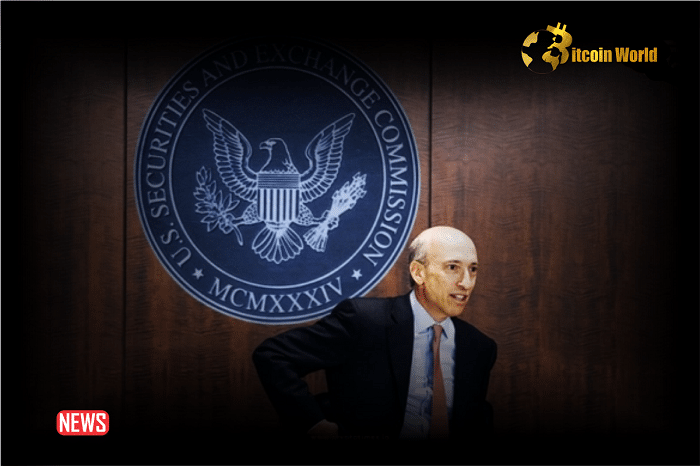Hold on to your hats, crypto enthusiasts! In a stunning turn of events, the Securities and Exchange Commission (SEC), a major regulatory body in the US, has been slapped with sanctions by a United States district court. Why? For serious misconduct in their lawsuit against crypto firm Debt Box. Let’s dive into what exactly happened and why this is sending shockwaves through the crypto world.
What Did the Court Find?
Judge Robert J. Shelby didn’t mince words. He found that the SEC had intentionally misled the court. Yes, you read that right. The SEC, in its pursuit of a temporary restraining order (TRO) and asset freeze against Debt Box back in August, presented evidence that was, according to the judge, misrepresented.
Think about it – this is a serious accusation. Judge Shelby stated unequivocally:
“The SEC’s conduct constitutes a gross abuse of the power entrusted to it by Congress and substantially undermined the integrity of these proceedings and the judicial process.”
Strong words, right? This isn’t just a minor procedural issue; it’s a fundamental challenge to the integrity of the legal process.
The $50 Million Crypto Scheme That Wasn’t Quite As It Seemed
The SEC had accused Debt Box of orchestrating a massive $50 million fraudulent cryptocurrency scheme. To secure the TRO and asset freeze, they made some alarming claims. One of them was that Debt Box had already sent $720,000 overseas and was poised to flee to the United Arab Emirates, ready to spirit away even more assets if they got wind of the impending order.
See Also: Solana Meme Coin, Slerf, Accidentally Burned $10M of Presale Funds
The Misrepresented Evidence: Where Did the Money Actually Go?
Here’s where things get really interesting. Judge Shelby, in a subsequent review, determined that the SEC had, in fact, misrepresented the evidence. That $720,000 transfer? It wasn’t an international flight of funds at all. It was, in reality, a domestic transfer within the United States.
Let that sink in. The very basis for the SEC’s urgent request for a TRO and asset freeze was built on a factual misrepresentation. This wasn’t a minor oversight; it was a critical error that painted a misleading picture to the court.
SEC Attorney Called Out for Misleading Conduct
Judge Shelby didn’t stop there. He specifically called out SEC attorney Michael Welsh for misleading the court and attempting to obfuscate the truth. According to Shelby:
“Welsh knew his statement from the TRO hearing was incorrect. Rather than correcting the misstatement, he and the SEC attempted to subtly shift the language to gloss over and perpetuate the misconduct.”
This is a direct accusation of deliberate misdirection and a failure to rectify a known error. It paints a picture of an agency more concerned with winning a case than with presenting accurate information to the court.
What Are the Sanctions?
So, what’s the price for this “gross abuse of power”? Judge Shelby ordered the SEC to pay Debt Box’s attorneys’ fees and costs. This means the SEC will have to foot the bill for all expenses Debt Box incurred as a result of the SEC’s misconduct.
While the financial penalty is significant, perhaps the bigger consequence is the reputational damage to the SEC. This sanction raises serious questions about the SEC’s investigative practices and its approach to regulating the crypto industry.
Why Does This Matter for Crypto?
This case is significant for several reasons, especially for the cryptocurrency space:
- Accountability for Regulators: It demonstrates that even powerful regulatory bodies like the SEC are not above the law and can be held accountable for misconduct.
- Fairness in Crypto Regulation: The crypto industry has often felt targeted by regulators. This case highlights the importance of fair and accurate processes in regulatory actions.
- Due Process: It underscores the importance of due process and the right to a fair hearing, even when facing accusations from powerful entities.
- Transparency and Honesty: It sends a message that transparency and honesty are paramount, even in high-stakes legal battles.
Looking Ahead
The sanctions against the SEC in the Debt Box case are a landmark moment. It remains to be seen what long-term impact this will have on the SEC’s approach to crypto regulation. Will it lead to more cautious and evidence-based investigations? Will it foster a more constructive dialogue between regulators and the crypto industry?
One thing is clear: this case serves as a potent reminder that regulatory power must be exercised responsibly and with the utmost integrity. The crypto world will be watching closely to see how the SEC responds and what lessons are learned from this significant rebuke.
#Binance #WRITE2EARN
Disclaimer: The information provided is not trading advice, Bitcoinworld.co.in holds no liability for any investments made based on the information provided on this page. We strongly recommend independent research and/or consultation with a qualified professional before making any investment decisions.


